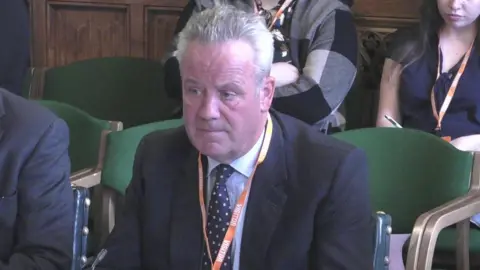Thames Water, the UK’s largest water supplier, is currently grappling with significant financial challenges, compelling its leadership to appeal to the regulatory body, Ofwat, for leniency regarding possible fines. In remarks made to Members of Parliament (MPs), Thames Water’s chief executive, Chris Weston, highlighted the dire implications of substantial penalties. He suggested that such fines could jeopardize the company’s operational stability and hinder any potential investments necessary for improvement and maintenance of services.
Weston emphasized that immediate financial repercussions, such as fines, would not only drain resources but could lead Thames Water to necessitate a bailout or nationalization. As the company seeks to make a turnaround, it is crucial that it maintains sufficient cash flow to prevent further deterioration and address pressing issues like sewage spills and leakage, which have drawn severe criticism from regulatory offices and the public alike.
The ongoing discussions with Ofwat appear to be focused on crafting a “turnaround regime” aimed at preventing a vicious cycle where fines accumulate due to insufficient funds for necessary improvements. Weston articulated that any imposed penalties could amount to nearly £900 million over the next five years, further complicating the firm’s capability to attract the investments vital for revamping services and infrastructure.
In light of these challenges, Thames Water’s leadership is exploring other financial support avenues. This includes discussions with the private investment firm KKR regarding a potential cash infusion of up to £5 billion. However, any agreement remains contingent on consensus from various lenders regarding debt relief on the approximately £20 billion owed to them. Reports suggest that some lenders could face total write-offs on their loans, further complicating the financial landscape for Thames Water.
The urgency of the situation was evident during a recent Environment Select Committee session where MPs fiercely interrogated key executives of Thames Water, including Weston and chairman Sir Adrian Montague. They scrutinized the company’s decision-making frameworks, questioning why it narrowed potential bidders for investment from five to one. Additionally, MPs expressed concern over the choice to take a high-interest £3 billion loan instead of pursuing more affordable options earlier this year, especially when other financial paths were seemingly available.
Despite facing intense scrutiny, Thames Water contends that these financial maneuvers were critical for avoiding total insolvency. The company’s leadership previously appealed to Ofwat to permit a 53% increase in bills over five years, far beyond the regulator’s suggestion of a 35% rise above inflation to help facilitate essential investments. While the appeal has been temporarily paused, the company is hopeful for negotiation with Ofwat to restructure impending fines, which might negate the need for steep bill increases.
Nonetheless, this plea for special consideration amidst financial turmoil has raised eyebrows. Consumer advocacy leaders, like Mike Keil from the Consumer Council for Water (CCW), have expressed skepticism, arguing that the public may struggle to sympathize with a company that has historically underperformed and faced numerous service delivery complaints. Critics suggest that while Thames Water’s situation may call for unique handling, it is essential to maintain accountability to consumers who rely on these crucial services.
As Thames Water navigates this challenging terrain, it is not alone. Other water providers, such as Southern Water, are similarly negotiating with lenders for relief to allow for fresh equity funding. Meanwhile, broader reevaluation of the water sector’s operational framework is underway, spearheaded by Sir Jon Cunliffe, the former deputy governor of the Bank of England. His anticipated recommendations, set to be unveiled by the end of May, may include a comprehensive overhaul in regulation and management to prevent such crises in the future.
In conclusion, Thames Water’s plea for leniency from Ofwat reflects a larger narrative about the sustainability and accountability of utility companies in the UK. With stakeholders watching closely, the outcomes of these negotiations could shape not only the future of Thames Water but also the broader water industry standards and consumer protections in the nation.



